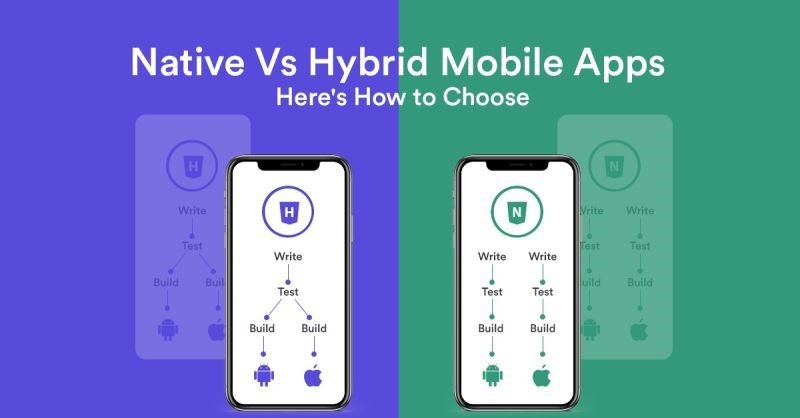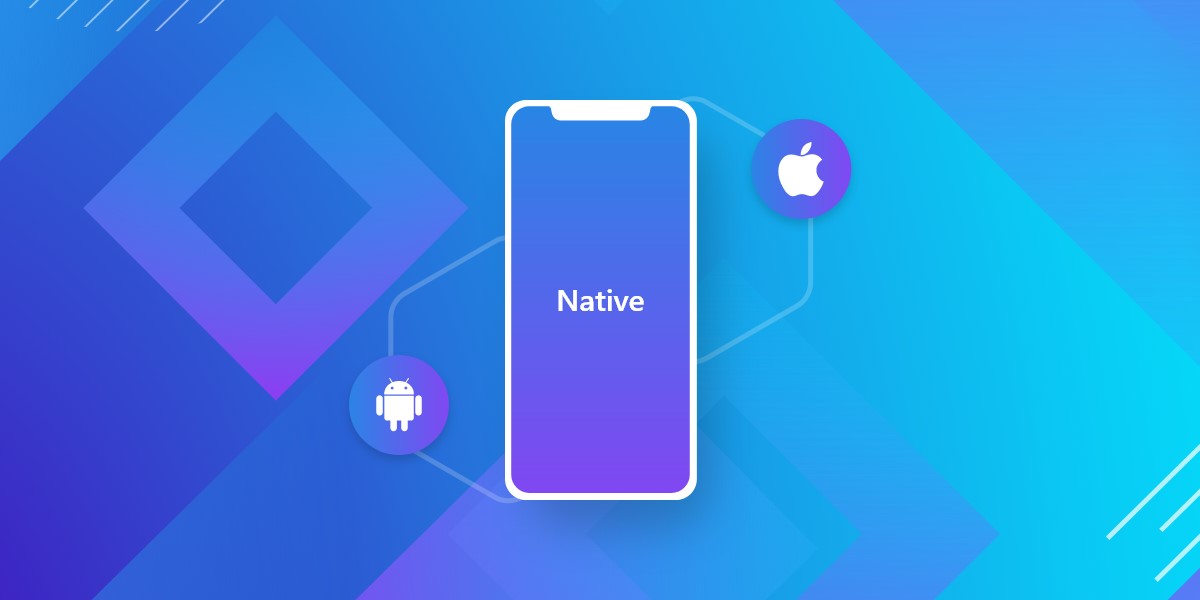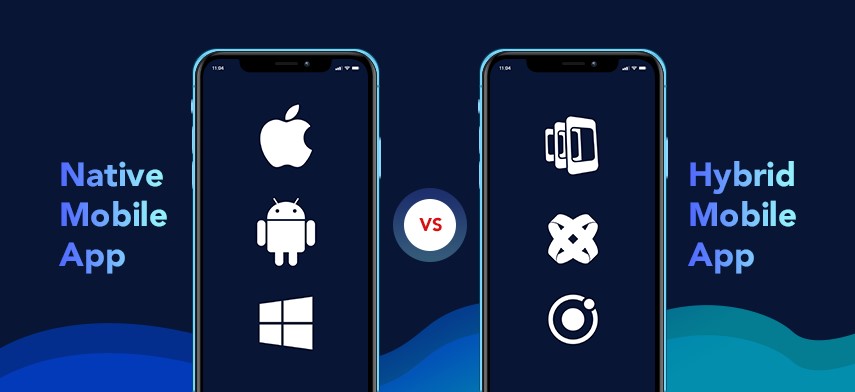Hybrid Apps Vs Native Apps
Mobile applications have become a vital part of the business world, and the success of any app depends on the development approach used. According to Statista, as of the third quarter of 2022, approximately 3.55 million mobile apps were available for download on the Google Play Store and 1.6 million on the Apple App Store. With such a vast number of apps available, it can be overwhelming for someone not versed in app development to choose the right option for their organization.
When choosing between Native and Hybrid applications, it's essential to understand the differences. Native apps are developed specifically for a particular operating system, such as iOS or Android, and are written in programming languages specific to that platform. On the other hand, Hybrid apps are developed using web technologies such as HTML, CSS, and JavaScript and can run on multiple platforms using a single codebase.
Native apps are known to be faster, offer better performance, and provide a superior user experience. However, Hybrid apps are more cost-effective and easier to develop and maintain, making them a popular choice for smaller businesses or those on a tighter budget. Choosing the right app development approach for your organization can be daunting. Still, with the help of a developer partner and an understanding of the differences between Native and Hybrid apps, you can make an informed decision that suits your business needs.
Hybrid Apps
Hybrid applications are programs that combine native and web application elements. Developers use web technology languages such as HTML, CSS and JavaScript and development frameworks such as Flutter, React Native to code the app, which then gets condensed into a native app for installation on devices - giving it all the benefits of both worlds! Hybrid apps are created with internal APIs that grant them full access to a mobile device's features. However, unlike native apps that can operate offline since they are downloaded, hybrid apps require an internet connection.
Hybrid app development is primarily based on web applications designed for various platforms and accessible through a web browser. These apps are generally associated with mobile computing, which refers to technology that enables data, voice, and video transmission through a wireless-enabled device without the need for a tangible link. This technology involves mobile communication, as well as mobile hardware and software.
Advantages of Hybrid Apps
- Hybrid apps require just one code base that can run across all platforms. At the same time, Native applications necessitate separate builds and maintenance for each platform - which can be time-consuming and expensive for developers.
- Hybrid apps can benefit from hardware-based performance acceleration, similar to Native apps, providing better user experiences and overall app performance.
- Hybrid apps feature a "one-size fits all" design, saving developers time and money when creating multiple versions of the same app for various platforms.
- Hybrid applications provide similar and consistent user experiences across platforms, which can be advantageous in efficiency. However, they may not consider how users behave differently across different environments, potentially impacting overall satisfaction.
- Using web technologies, hybrid apps can be developed for any platform, including websites. This means developers or development teams can create one app across all platforms.
- Using web technologies, hybrid apps can be developed for any platform, including websites. This means developers or development teams can create one app across all platforms.
Disadvantages of Hybrid Apps
- Hybrid apps require a continuous network connection to work efficiently due to their similarity to web apps.
- Plugins are needed for hybrid apps to access the device's built-in features.
- Hybrid apps compromise the user experience as the interface for Android and iOS are compromised, and too much focus on one can compromise the user experience for the other.
- Native app developers are often required to create hybrid apps because they don't fix fundamental functional issues specific to native app development.
Hybrid App Development Frameworks
Hybrid app development frameworks are becoming increasingly popular among developers because they allow for creating of mobile applications that can run on multiple platforms. Some of the most commonly used hybrid app development frameworks include Apache Cordova, React Native, Ionic, Xamarin, Flutter, PhoneGap, Sencha Touch, Appcelerator Titanium, Onsen UI, Kendo UI. These frameworks allow developers to create cross-platform mobile applications using web technologies such as HTML, CSS, and JavaScript while also providing access to native device APIs and features. Each framework has its own unique strengths and weaknesses, so it's essential for developers to choose the one that best fits their project requirements and skillset.
Native Apps
Native mobile applications are designed to run on a specific platform or device, using its hardware and software capabilities. Compared to mobile cloud apps or web apps that work across multiple systems, native apps offer superior performance and utilize cutting-edge technology. Apple iOS and Google Android are the two primary mobile operating system platforms, and developers typically utilize different programming languages to code native apps for each. Java is often employed when creating Android-native apps, while Swift, U-Kit or Objective-C can be employed when crafting iOS applications.
Native mobile apps operate quickly and precisely, giving you access to all native user interface (UI) controls and layouts, creating a streamlined user experience that's both intuitive and effortless. However, creating a native app for either iOS or Android necessitates separate coding efforts and an app built for one platform will not work on the other. If you wish to launch your app across both platforms simultaneously, you will require more funding and a larger team to create platform-specific versions.


Advantages of Native Apps
- Native apps are specifically designed for a particular platform, taking advantage of its native capabilities and working faster than others.
- Native apps installed directly on a device can still function offline and offer basic features without internet connectivity
- Native applications tend to have an intuitive visual style that matches the design language of the operating system, which may enhance user experience.
- Native code may be faster than HTML or JavaScript, even though WebGL standards allow browsers and hybrid apps with graphics-heavy functions to meet performance targets.
- Native apps typically maintain aspect ratios to enhance the visuals and images within an application, which can be especially helpful for visually-driven programs.
- Native software development kits (SDKs) enable app developers to easily access device features without delving into the intricate world of native plugins, making creating and managing apps much simpler.
Disadvantages of Native Apps
- In Native Apps, releasing the same feature simultaneously on multiple platforms can be complex and time-consuming, as these apps have different codebases for each platform. This requires developers to write separate code for each platform - an endeavour that takes considerable effort.
- Development, maintenance and administration of a Native application across different platforms necessitate different skill sets, increasing the cost of keeping it running smoothly. Each platform has its own programming languages, tools and software development kits (SDKs).
- Developing a Native application for multiple platforms can be a complex and time-consuming task, increasing development time and expense. This is because each platform has its own set of guidelines, design patterns, and frameworks specific to that platform.
- Each platform codebase requires its own release cycle and updates, adding to development time and cost. This is because each platform has its own app store and review process; updates must be approved separately for each platform.
- Native apps tend to take more time to download, which could cause potential users to abandon the process halfway through if it takes too long. To do this, users need to open the app store, search for it, open it, agree to terms and conditions, and then finally download the application if it proves unworthy of all this effort.
Native Apps Development Frameworks
Native app development frameworks are programming tools that developers use to build mobile applications for specific platforms such as iOS or Android. Some popular Native Apps Development Frameworks include iOS – Swift, iOS - Objective-C, Android – Java, Android – Kotlin etc. For iOS development, Swift and Objective-C are the most commonly used programming languages, and Java and Kotlin are popular choices for Android development. These frameworks provide tools and libraries to help developers build user interfaces, manage data, access device features, and more.


Difference between Hybrid App and Native App
| Aspect | Hybrid App | Native App |
|---|---|---|
| Installation | Don't require installation | Require installation |
| Maintenance | Require less maintenance | Require high maintenance |
| Time and cost | Cost-effective and require less development time | Require a large budget to develop an app that is compatible with multiple platforms |
| Codebase | Have a single codebase | Have multiple codebases |
| User experience | Don't have a good user experience | Provide the best user experience |
| Languages used | Use JavaScript, HTML, CSS | Use Java, Swift, Kotlin |
| Platform Dependent | Can work on various platforms | Particularly developed for one platform |
| Languages used | Updations are centralized for mobile web apps | Can be updated from the play store or app store |
Hybrid vs Native Apps: Which Should I Choose?
As mobile app development continues to expand, businesses are faced with the decision of creating either a native or hybrid app. Both have advantages and drawbacks, so the final decision depends on your business objectives and project requirements. Hybrid apps comprise web technologies such as HTML, CSS and JavaScript wrapped in a native container to run across multiple platforms. While cost-effective to construct and update, hybrid applications may not perform as well or offer the best user experience compared to native alternatives.
Native apps, on the other hand, are tailored for a specific platform with its native programming languages and tools. Native applications offer superior performance, an improved user experience, and access to device hardware features; however, developing them can be more costly and time-consuming. When selecting between hybrid and native apps, it is essential to consider your project-specific needs.
If your task necessitates high-performance graphics or complex features, a native app may be preferable; conversely, hybrid apps offer cost savings by working across multiple platforms at once. Finally, the final decision between hybrid and native apps comes down to your budget, project requirements, and target audience. Be sure to carefully assess each option's advantages and drawbacks before making your final selection.







